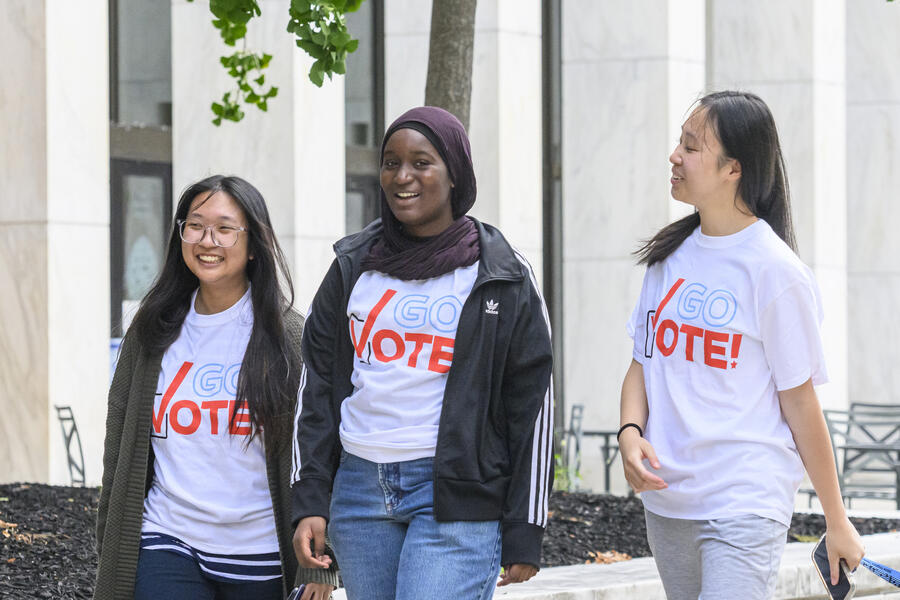During a busy week of dorm gatherings, dining hall socials, and outings to local hotspots, the orientation program for Johns Hopkins University's Class of 2028 dedicated an entire day to what it means and looks like to engage not just in the rudiments of campus life but in a higher calling: the tenets of democracy.
"Admittedly, this day might seem like an abrupt left turn from where you've been focused, but that wouldn't be true," JHU President Ron Daniels told the roughly 1,300 new students at the university's fourth annual Democracy Day. "We are doing this because we believe that universities have a central role to play in preparing you for the responsibilities of democratic participation."
The event was launched in 2021 by the university's Center for Social Concern, the Orientation team, and the SNF Agora Institute at Johns Hopkins to introduce first-year students to the democratic process and the critical roles they play in shaping their communities and world.
Video credit: Johns Hopkins University
Democracy Day and its objectives are core to the overall experience at Johns Hopkins, Daniels said, and necessary in an era of heightened political polarization and threats to democracy worldwide.
"During your time here, you're going to develop your capacity for reason, for analytic rigor, and for clear and persuasive communication, all of which will make your voice and the democratic process more influential, more potent, [and] more effective," Daniels said. "You'll expand your capacity to bridge and work across differences, backgrounds, perspectives, values, and goals held by your fellow students, even when those goals [and] values come into conflict and are different for one another."
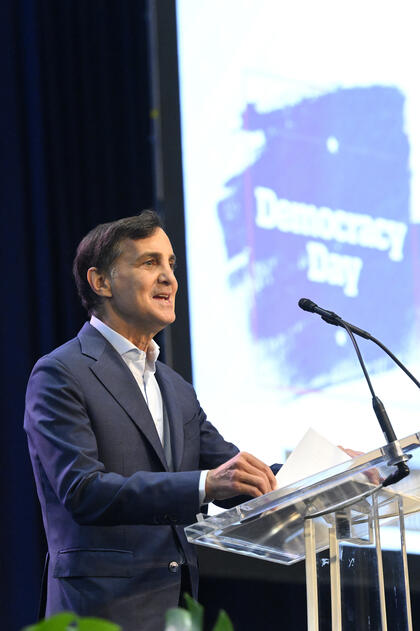
Image caption: JHU President Ron Daniels
Image credit: Will Kirk / Johns Hopkins University
These skills, Daniels continued, are vital to "a healthy and functioning democracy … [and] will help us guard against the prospect of poisonous distrust and polarization that exacerbate our differences and prevent us from drawing strength from one another."
For Johns Hopkins' Provost Ray Jayawardhana, who is also a physics and astronomy professor, participatory democracy and the academic mission rely on shared values. "The pursuit of knowledge at the university and active citizenship in a democracy are both dynamic, collaborative processes that require constant reexamination, reimagining, and renewal," Jayawardhana told students. "Just as our classrooms are enriched by a dynamic convergence of different perspectives, so too are democracies strengthened when a broad range of views are able to be heard, acknowledged, and considered."
This year's incoming class, made up of students from 35 countries, 46 states, the District of Columbia, and three U.S. territories, sat in rows of chairs that nearly filled the gymnasium floor of the state-of-the-art Ralph S. O'Connor Center for Recreation and Well-Being. Throughout the morning, they listened to faculty, staff, and returning Hopkins students discuss the tenets of democracy and opportunities across campus and in Baltimore to get involved, while taking part in activities to cultivate and practice civil discourse. In the afternoon, they mingled over lunch on the sun-drenched quad before attending the Democratic and Civic Engagement Fair—where they met with student and community leaders to learn about opportunities for engagement—and reconvening in the recreation center for more talks and break-out sessions.
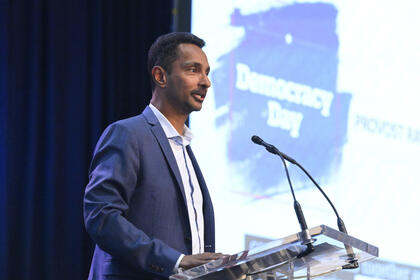
Image caption: Provost Ray Jayawardhana
Image credit: Will Kirk / Johns Hopkins University
Between activities, students pointed out gym amenities like the multi-floor rock-climbing wall and discussed the day's events and speakers, like Anne Applebaum, a senior fellow at the Johns Hopkins School of Advanced International Studies and the SNF Agora Institute.
"She's really famous," a student told peers about Applebaum, a staff writer for The Atlantic and a New York Times bestselling author of books that include Autocracy, Inc.: The Dictators Who Want to Run the World (Doubleday, 2024), Twilight of Democracy: The Seductive Lure of Authoritarianism (Vintage, 2018), and Gulag: A History (Anchor, 2004), which won a Pulitzer Prize.
Applebaum, a senior fellow at the Johns Hopkins School of Advanced International Studies and the SNF Agora Institute, spoke to students via a jumbo screen from Poland, "a country that wanted democracy back in 1989, after the collapse of the communist system, [and went on to have] a successful democracy for three decades before almost losing it again … when an autocratic populist movement won an election in 2015."
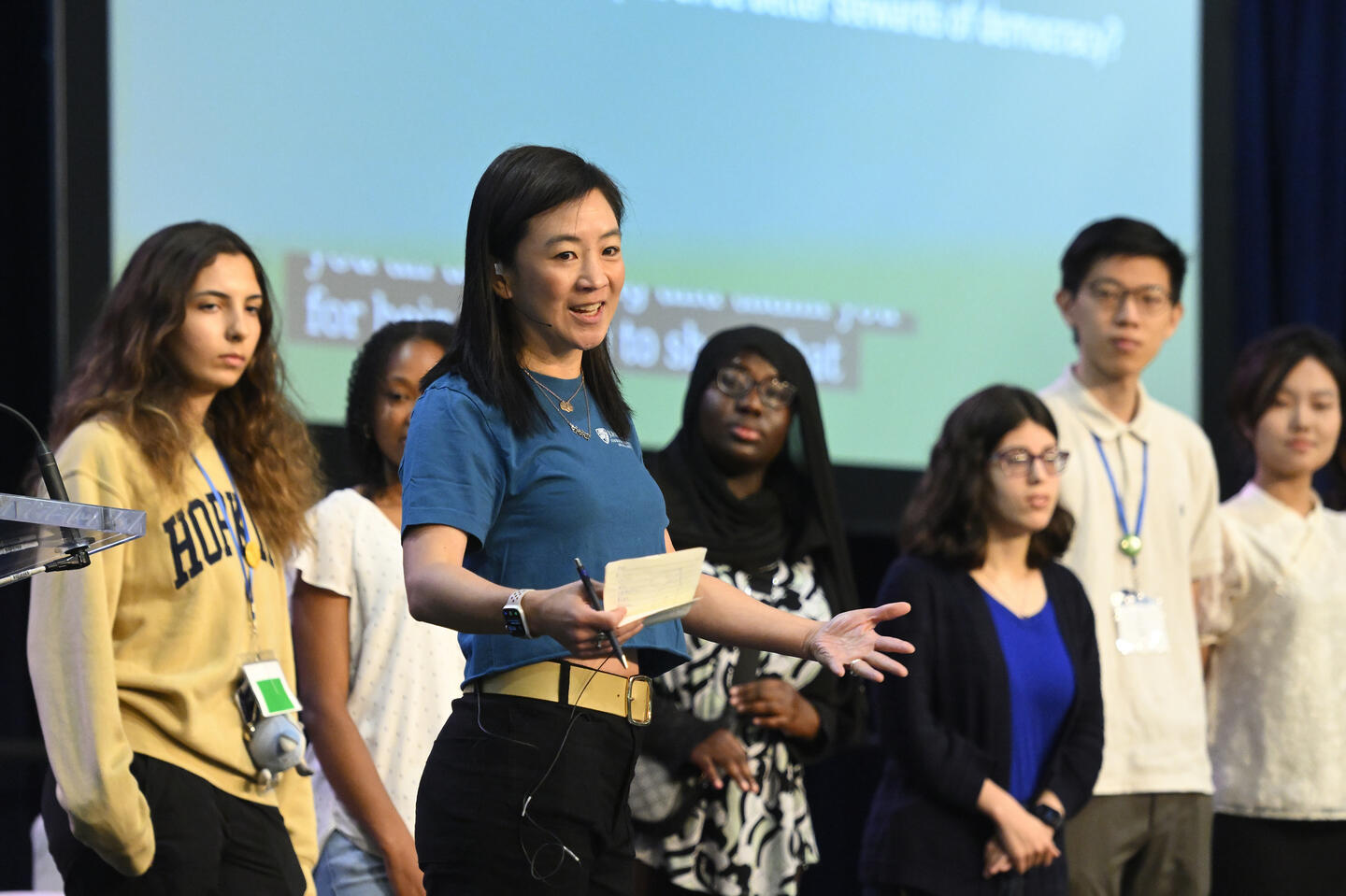
Image caption: SNF Agora Institute Director Hahrie Han
Image credit: Will Kirk / Johns Hopkins University
Everything Poland had worked for nearly vanished, Applebaum said.
But the Polish people organized and formed a national movement made up of both liberals and conservatives—"an important lesson because we're now living at a moment in world history when democracies, even stable democracies, even the oldest democracies, are under enormous challenges," she continued, urging students to take full advantage of the programs, clubs, courses, and partner organizations at Johns Hopkins to learn about rising autocracies that threaten democracy.
"The pushback against the autocratic world … [will likely] occupy us for the next several decades" and require strategic thinking and problem-solving, she said in her concluding remarks. "You guys are going to be part of that struggle, and I welcome you … [as partners in] that challenge."
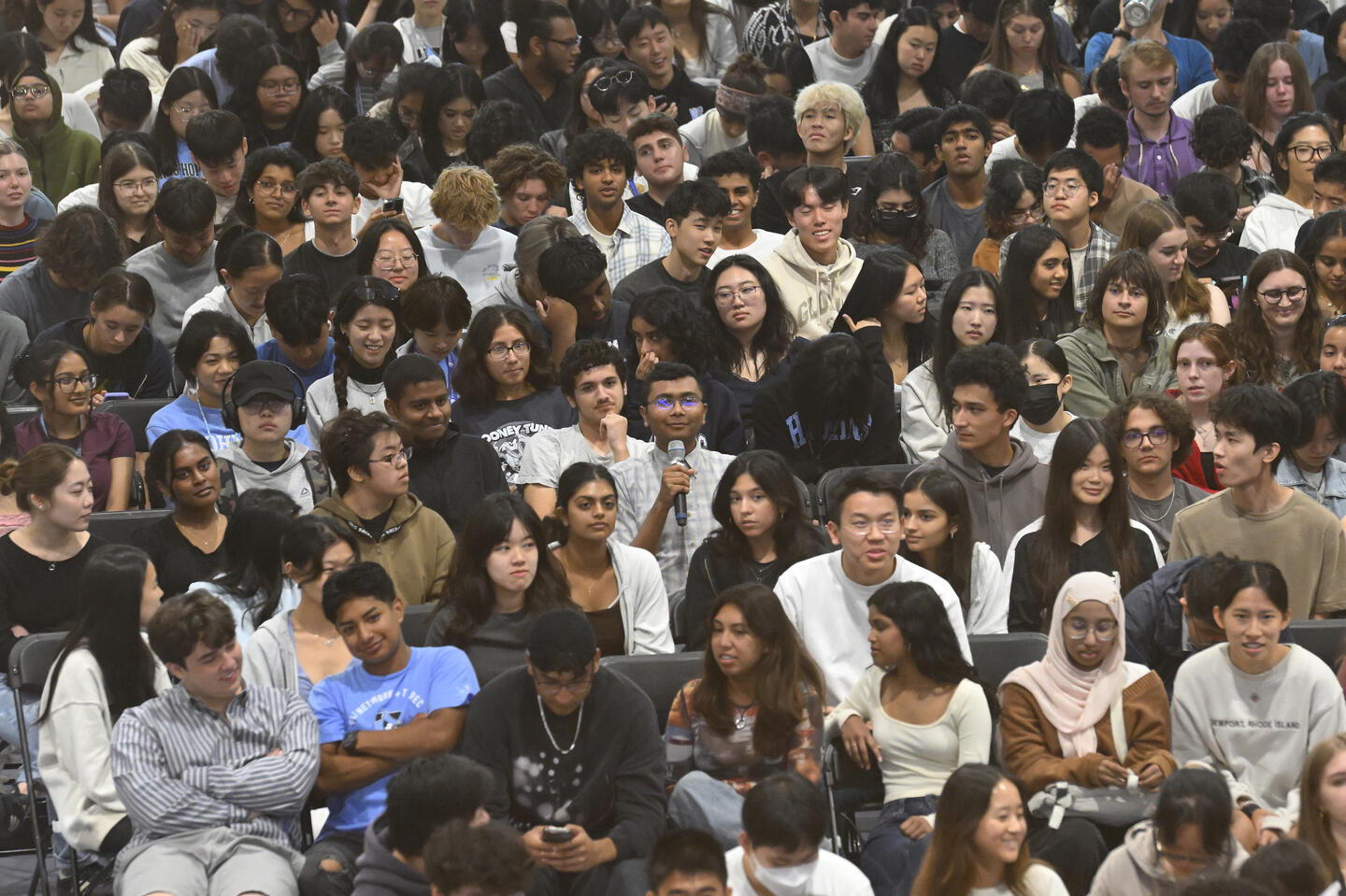
Image credit: Will Kirk / Johns Hopkins University
Understanding democracy
Other speakers for the day included a mix of Johns Hopkins administrators, faculty, and students in addition to guest speakers Yuval Levin, a conservative political analyst and journalist who serves as a director and senior fellow at the public policy think tank American Enterprise Institute, and Zeke Cohen, councilman for Baltimore City's first district and the 2024 Democratic nominee for president of the Baltimore City Council.
Administrators and faculty included:
- Brittini Brown, associate provost for student engagement and the dean of students
- Lilliana Mason, a political science professor and expert in partisan identity and bias in the U.S., who recently co-authored Radical American Partisanship: Mapping Violent Hostility, Its Causes, and the Consequences for Democracy (University of Chicago Press, 2022)
- Jasmine Blanks Jones, executive director of Johns Hopkins' Center for Social Concern and the founder of Burning Barriers Building Bridges Youth Theatre, a cultural performance company dedicated to community empowerment through art
- Hahrie Han, director of the SNF Agora Institute and a political scientist professor and author of four award-winning books on political activism and grassroots efforts, plus the recently released Undivided: The Quest for Racial Solidarity in an American Church (Knopf, 2024)
- Amy Binder, a sociology professor who studies the intersections among politics, activism, and education—and whose award-winning books include The Channels of Student Activism: How the Left and Right Are Winning and Losing in Campus Politics Today (University of Chicago Press, 2022) and Becoming Right: How Campuses Shape Young Conservatives (Princeton University Press, 2013)
Nasreen Naqvi, president of the student senate at Johns Hopkins and a senior majoring in molecular and cellular biology also spoke, along with close to a dozen returning undergraduates, also spoke.
Among the group's key messages: Engagement in democracy means more than just voting in elections, though voting is critical. Likewise, engagement doesn't call upon students to commit to lives or careers as politicians, policymakers, protestors, or activists. "These are options—not requirements—for getting involved," Mason told the audience. "Democracy is something that everyone needs to participate in, even scientists, doctors, and physicists."
Another key message: Don't overlook local opportunities. "If you want to make real, meaningful change, do it at the local level because you will see it with your own eyes," said Cohen, the city councilman who worked as a public-school teacher in West Baltimore's Sandtown-Winchester neighborhood before transitioning to a career in politics. "The brain power that you bring—Baltimore needs it."
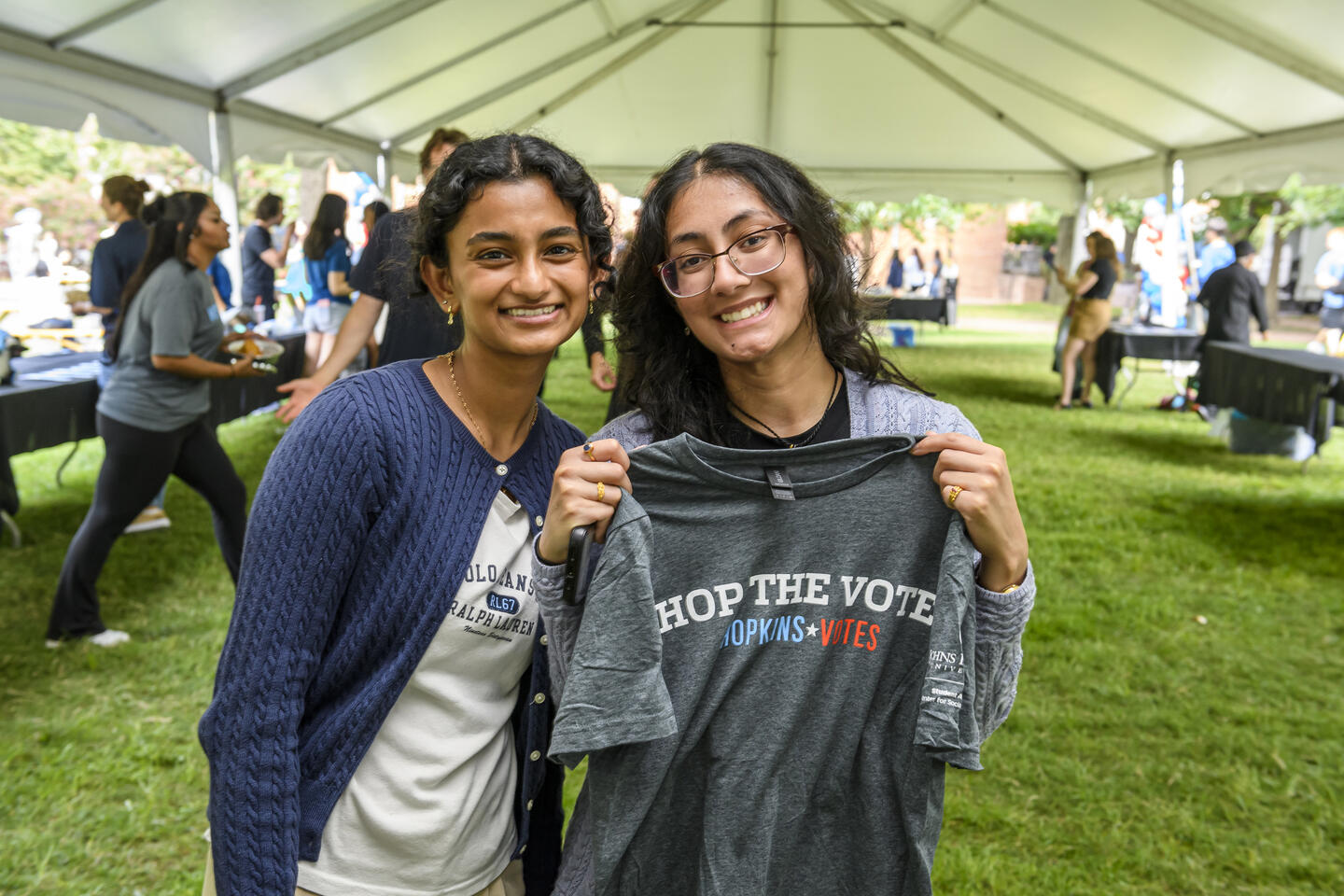
Image credit: Will Kirk / Johns Hopkins University
The art of civil discourse
In addition to hearing from academics who are passionate about democracy, Democracy Day programming gave students a chance to meet and interact with one another while practicing skills discussed and modeled by faculty.
Hahrie Han challenged students with a question about how to foster constructive, healthy communities, where people feel comfortable voicing and talking through their thoughts and differences.
"Research shows that the best learning happens in communities where people feel like they belong, where people feel connected to each other—that's when we're able to be creative and take risks," she said. "So that's what I want you to think about: How are you creating these conditions in the different communities you inhabit, including online communities?"
Han also led a role-playing activity that involved defusing a tense conversation and putting others at ease in ways that kept the discussion civil, rather than escalating into a shouting match. "Talking at people, instead of talking with them, … making assumptions, … and giving people ultimatums—all of this makes them feel like they have to agree with you, or they're a horrible person," Han said. These habits of how we engage with each other, including body language, matter, she emphasized.
Later in the day, students could choose to attend one of over 20 pop-up seminars on challenges of democracy, each led by faculty from across the institution, or listen to and participate in a debate on the impact of AI on societal inequality between Rama Chellappa, a Johns Hopkins Bloomberg Distinguished Professor and co-director of the Data Science and AI Institute, and Louis Hyman, a professor of political economy in history in the Krieger School of Arts and Sciences and the SNF Agora Institute. Glory Liu, the assistant director of the SNF Agora Institute's Center for Economy and Society and an assistant research professor, moderated the debate, and Taylor Hahn, program director for Advanced Academic Programs' Master of Arts in Communication, led a post-debate analysis.
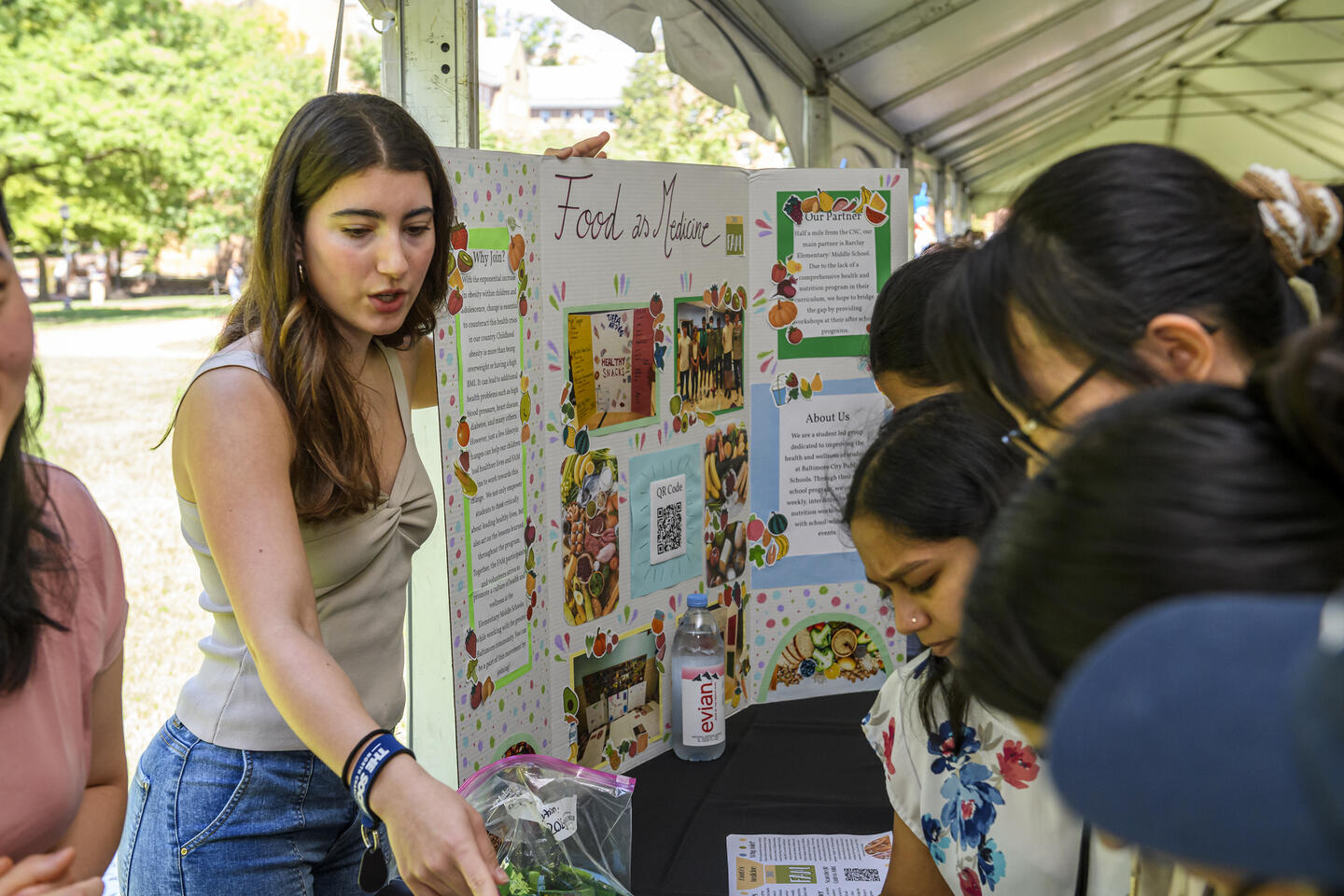
Image credit: Will Kirk / Johns Hopkins University
Democracy in action
The buzz beneath the tent set up for the Democratic Civic Engagement Fair was palpable, with incoming students chatting with faculty and staff, returning students, and Baltimore residents all involved in dozens of clubs and programs with a shared intent: to make the world better.
At one table, Nikole Irigaray, a rising junior in public health, shared information with a cluster of first-year students about her work with Food as Medicine, a student-led program that promotes healthy eating and wellness to students in Baltimore City Public Schools. "We work primarily with Barclay Elementary/Middle School," she said, "which is just a few blocks away."
Across the way, Luana Kiandoli stood at a table representing Baltimore Sister Cities, a nonprofit affiliated with the mayor's office that promotes cooperation and exchanges between Baltimore and its international sister cities, which range from Odesa, Ukraine, to Xiamen, China, to Alexandria and Luxor, Egypt, and Gbarnga, Liberia. Retired from her former role as chief medical technologist at Walter Reed Army Medical Center, Kiandoli started volunteering with Baltimore Sister Cities—and specifically its Liberia program—because "I love history and learning about the world, and I love talking to people," she said.
As a mix of jittery students approached her table, Kiandoli put them at ease with questions about their backgrounds and stories of her work with Baltimore Sister Cities. "We've raised awareness about human trafficking through a partnership with the U.N.; helped girls in poverty get the sanitary napkins and products they need; and taught teens about their bodies and family planning," Kiandoli said, before calling out to other students passing by: "Did you register to vote yet?"
"I told you I would touch my toes 10 times once you tell me you've registered to vote—not an easy feat for a woman in her 80s," she added, laughing as she bent over, stretching her arms toward the ground.
At another table, Arionna Bell, a rising junior majoring in molecular and cellular biology who plans to attend medical school, encouraged students to register to vote and generated excitement for events planned this fall related to the U.S. presidential election, from debate watch parties to post-election debriefs. Bell was open and honest with first-year students about her own experience.
"My first year at Johns Hopkins, I had promised my grandmother I would vote, but I missed my chance," she admitted. "I blamed it on classes but felt terrible, given that my grandmother had fought hard for her right to vote in North Carolina, and I couldn't even take a few minutes out of my day to do it."
After that experience, Bell committed not just to voting at every election but to inspiring other students to vote. Her decision led to her current role as co-director of Hopkins Votes, a nonpartisan initiative that provides voter assistance and education to Johns Hopkins' students, faculty, staff, and the wider community. "I've come a long way," Bell said. "And I tell people: 'My passion might be in medicine, but systems like health care affect all of us, and I approach my work and life with my heart.'"
When asked about low voter turnout among young people in recent elections, Bell responded with optimism: "That's changing, largely due to grassroots efforts and issues emerging that we care about like climate change and reproductive rights.
"Gen Z is energized—I feel it. We're going to improve things."
Correction: Baltimore Sister Cities' operational status was misstated in an earlier version of this article. The Hub regrets the error.
Posted in University News, Student Life
Tagged orientation, snf agora institute, democracy, election 2024




